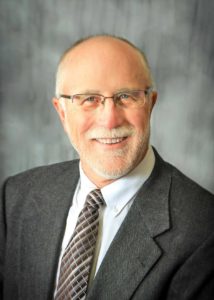Phil Hamm, soon to retire, reflects on 45-year career

As the director of Oregon State University’s Hermiston Agricultural Research and Extension Center, Phil Hamm has been at the forefront of potato research for decades. All good things must end, however, and the time has come for Hamm to call it a career. He’ll retire in a few months.
Hamm has spent his entire 45-year career studying plant disease, including the past 30 years at Oregon State in some capacity. He has focused primarily on topics that affect growers in the Pacific Northwest, but often his research has rippled to affect the industry worldwide.
1. What question do you hear most from growers?
What I hear from growers and field men alike is related to whether or not (the HAREC) will be there in the future to provide the kinds of needed and important new research-based information related to potato breeding, agronomy, insects, diseases and more, as well as things like insect and plant disease diagnosis. While our station budget isn’t what it needs to be, I see HAREC truly as a regional center and believe — based on discussion with college administrators — the facility will be here in the future.
2. What’s been the biggest development in plant pathology since you started?
After 44-plus years, lots of things have changed but the most significant was likely the move from culturing fungi and bacteria, or inoculating test plants with sap from plants suspected to have viruses and using that information to determine the causal agent of the disease symptoms. All of this usually took days, sometimes weeks. Now we use molecular-based techniques that identify specific bacteria, fungi, viruses, phytoplasmas or whatever plant pathogen, tests that recognize specific DNA or RNA sequences that can only belong to that organism. Identifications now can take only a matter of hours and are more reliable.
3. If you could offer some advice to your 1990 self, what would it be?
Interesting question. Maybe the answer is balance. If you have a job that you really enjoy, working with and for people you really like, then work really isn’t work any longer. I really don’t have regrets, but I now see that family vacations could have been longer and more frequent and more time could have been spent fishing.
4. Are there any projects that you were part of that stand out?
Over the years, I focused on disease issues that were of importance to regional growers, although often these problems plagued the potato industry nationally or beyond. A few that come to mind: helping to understand the importance of fumigation, both for soil-borne fungal pathogens and nematodes and associated viruses; helping to develop a late blight forecasting model for the Columbia Basin and understanding how fungicide application methods differentially deposit the material; identifying and (analyzing) the complexity of potato viruses, particularly PVY; and helping to develop management principles for silver scurf.
5. Any projects you wanted to get to, but just didn’t quite make it?
There are a couple. One, put to rest the importance of diseases like white mold. Damage due to this disease is easily seen, therefore, incidence is usually overestimated. But does it really cause a yield loss in most cases? Better yet, does the cost of treatment warrant the expense if there is no yield loss? Secondly, getting a better handle of Pythium sp. seemingly causing late season tuber rot problems. We determined the species present in the soil, narrowed the list to P. ultimum and know that often times these isolates are mefenoxam-resistant. But we didn’t come up with management options to actually help other than to suggest very careful watering when vines start the downward use of water in August.
6. What is your favorite way to eat potatoes?
I like baked potatoes with all the trimmings. However, I also like reds or yellows that my wife quarters, adds olive oil to and puts in the oven with nothing else but salt and pepper.
7. What are you looking forward to doing a little more of now?
More time with grandkids (ages 5 and 3), who live literally next door (across a small pasture). To fill in the holes around that I will continue my community involvement with the boards or commissions I currently serve on, have a little more time to hunt and fish and likely will have wife-generated projects to accomplish. One thing is certain, I have been banished from the kitchen unless I am the one fixing dinner!
More from the Spudman 7:














